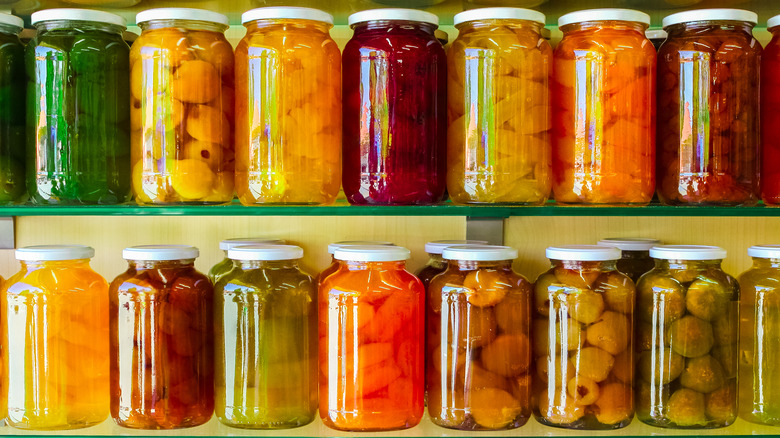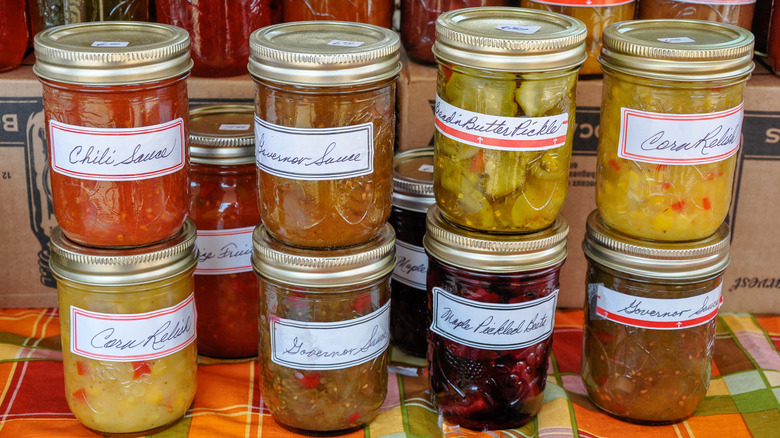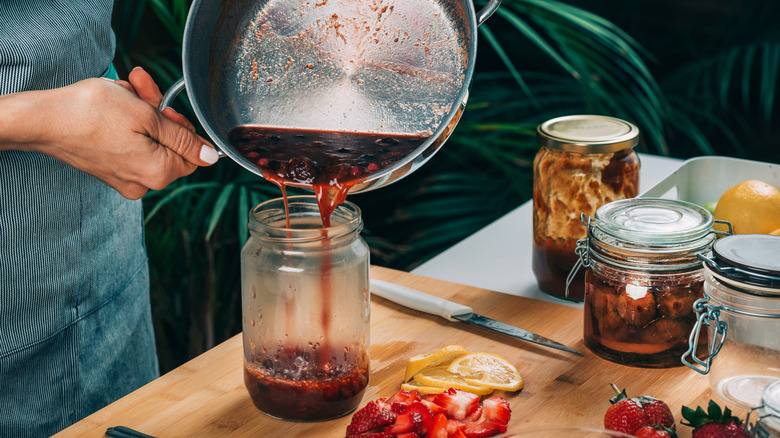How Cottage Food Regulations Can Affect Your Home Canned Food
Most store-bought food can't hold a candle to the homemade version created with care in a home kitchen. Your family's secret marmalade recipe is better than anything on the grocer's shelves, and it would be nice to turn a modest profit off your favorite preserves. The laws regulating food sales and the steep costs that come with renting commercial kitchen space can be intimidating to foodie entrepreneurs and keep them from bringing delicious products to the masses (per PEW). That's where cottage food regulations come in to clarify what homemade goods can be sold to the public.
Cottage food laws are the regulations that Food Safety News calls a leg up for the little guy. These laws, which vary from state to state, allow small-scale food producers to create food goods in a home kitchen while avoiding costly licenses and commercial kitchen rental fees that apply to larger food producers. Each state has different regulations regarding what kinds of food can be sold, and it's important to stay on top of these evolving regulations to abide by the law and provide products that are safe for consumption.
Cottage food regulations can vary from extremely strict rules to laissez-faire laws and everything in between. Cottage food producers often push for deregulation, but local health departments tend to pump the breaks. The overarching goal of most cottage food regulations is to keep the consumer safe from foodborne illnesses caused by high-risk foods and some home canned goods.
High- and low-risk cottage foods
Regulations on the cottage food industry are ever-changing and have undergone an overhaul in recent years as the number of small-time food makers looking to sell their goods has increased (via The Washington Post). As the pandemic closed down restaurants and businesses, people began looking for alternative ways to make ends meet, and a new wave of cottage food makers was created. How else were people going to get all that sourdough out of their kitchens?
If you're interested in bringing your baked goods to market, Food Safety News says you are mostly covered by cottage food regulations when planning to sell low-risk foods. Most baked goods do not contain perishable ingredients that require refrigeration; even though many bakery items include milk, eggs, and the like, they have been baked at high enough temperatures to render those ingredients stable and safe to consume. Cottage food laws make an exception when high-risk ingredients like meat and custards are included in baked goods. Other low-risk foods that most states allow are products like jams and chutneys made from fruits that are less prone to bacterial growth because of their naturally high acidity levels.
Cottage food regulations generally prohibit high-risk foods like meat, dairy, fresh vegetables, and baked goods that feature perishable ingredients (think meringue pie or pigs in a blanket). These foods aren't naturally acidic and run a higher risk of spoiling. Less stable foods can grow bacteria and spread foodborne illnesses that endanger consumers.
Cottage food laws and home canned goods
Home canning is an endeavor not to be taken lightly. Regulations on what can be made and sold by small cottage food producers are in place to keep consumers safe from foods that are prone to spoiling or require complicated preparations (via Food Safety News). Foods naturally contain bacterial spores that can grow into a dangerous toxin known to cause a deadly foodborne illness called botulism, especially in canned foods that have low acidity and weren't prepared correctly.
According to the National Center for Home Food Preservation, home canned goods must be prepared in a supremely clean kitchen with sterilized utensils using boiling water or a pressure canner. Botulinum bacteria are prone to growing in moist conditions on foods with low acidity, making it essential to choose foods with high acidity to comply with most cottage food laws.
Are cottage food regulations perfect? Many cottage food producers, like the Texas couple suing the state's health department over the definition of a pickle, would say no (per The Counter). Even though a low acid food can have its pH increased with the addition of vinegar and citric acid, most states err on the side of caution and outlaw any canned goods that start with a potentially hazardous ingredient. It's good practice to check resources like Pick Your Own to see what cottage food regulations apply in your state before venturing in home canned food production.


